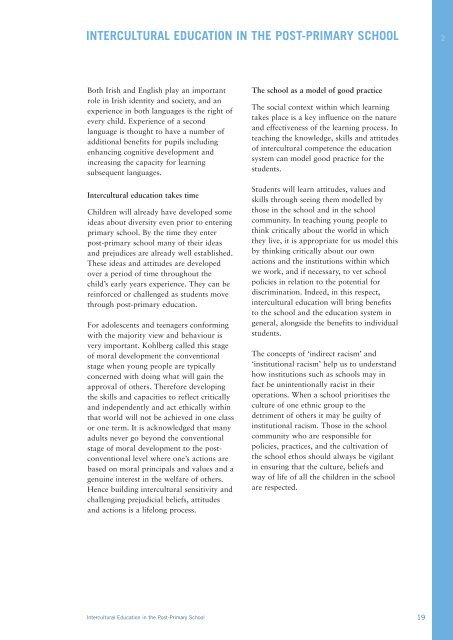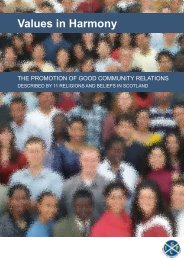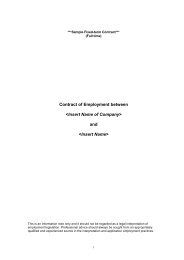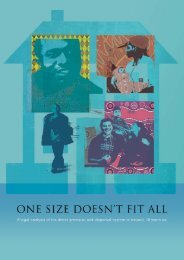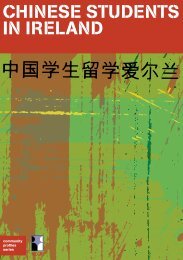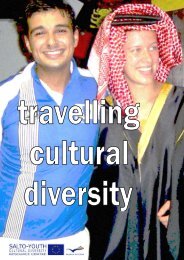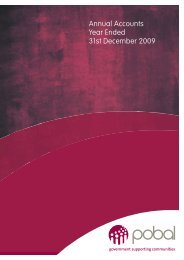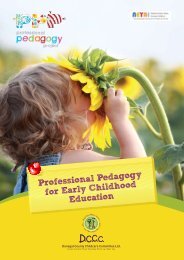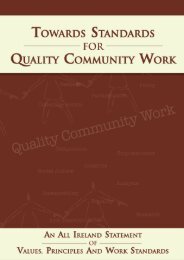Intercultural Education in the Post-Primary School - National Council ...
Intercultural Education in the Post-Primary School - National Council ...
Intercultural Education in the Post-Primary School - National Council ...
You also want an ePaper? Increase the reach of your titles
YUMPU automatically turns print PDFs into web optimized ePapers that Google loves.
INTERCULTURAL EDUCATION IN THE POST-PRIMARY SCHOOL 2Both Irish and English play an importantrole <strong>in</strong> Irish identity and society, and anexperience <strong>in</strong> both languages is <strong>the</strong> right ofevery child. Experience of a secondlanguage is thought to have a number ofadditional benefits for pupils <strong>in</strong>clud<strong>in</strong>genhanc<strong>in</strong>g cognitive development and<strong>in</strong>creas<strong>in</strong>g <strong>the</strong> capacity for learn<strong>in</strong>gsubsequent languages.<strong>Intercultural</strong> education takes timeChildren will already have developed someideas about diversity even prior to enter<strong>in</strong>gprimary school. By <strong>the</strong> time <strong>the</strong>y enterpost-primary school many of <strong>the</strong>ir ideasand prejudices are already well established.These ideas and attitudes are developedover a period of time throughout <strong>the</strong>child’s early years experience. They can bere<strong>in</strong>forced or challenged as students movethrough post-primary education.For adolescents and teenagers conform<strong>in</strong>gwith <strong>the</strong> majority view and behaviour isvery important. Kohlberg called this stageof moral development <strong>the</strong> conventionalstage when young people are typicallyconcerned with do<strong>in</strong>g what will ga<strong>in</strong> <strong>the</strong>approval of o<strong>the</strong>rs. Therefore develop<strong>in</strong>g<strong>the</strong> skills and capacities to reflect criticallyand <strong>in</strong>dependently and act ethically with<strong>in</strong>that world will not be achieved <strong>in</strong> one classor one term. It is acknowledged that manyadults never go beyond <strong>the</strong> conventionalstage of moral development to <strong>the</strong> postconventionallevel where one’s actions arebased on moral pr<strong>in</strong>cipals and values and agenu<strong>in</strong>e <strong>in</strong>terest <strong>in</strong> <strong>the</strong> welfare of o<strong>the</strong>rs.Hence build<strong>in</strong>g <strong>in</strong>tercultural sensitivity andchalleng<strong>in</strong>g prejudicial beliefs, attitudesand actions is a lifelong process.The school as a model of good practiceThe social context with<strong>in</strong> which learn<strong>in</strong>gtakes place is a key <strong>in</strong>fluence on <strong>the</strong> natureand effectiveness of <strong>the</strong> learn<strong>in</strong>g process. Inteach<strong>in</strong>g <strong>the</strong> knowledge, skills and attitudesof <strong>in</strong>tercultural competence <strong>the</strong> educationsystem can model good practice for <strong>the</strong>students.Students will learn attitudes, values andskills through see<strong>in</strong>g <strong>the</strong>m modelled bythose <strong>in</strong> <strong>the</strong> school and <strong>in</strong> <strong>the</strong> schoolcommunity. In teach<strong>in</strong>g young people toth<strong>in</strong>k critically about <strong>the</strong> world <strong>in</strong> which<strong>the</strong>y live, it is appropriate for us model thisby th<strong>in</strong>k<strong>in</strong>g critically about our ownactions and <strong>the</strong> <strong>in</strong>stitutions with<strong>in</strong> whichwe work, and if necessary, to vet schoolpolicies <strong>in</strong> relation to <strong>the</strong> potential fordiscrim<strong>in</strong>ation. Indeed, <strong>in</strong> this respect,<strong>in</strong>tercultural education will br<strong>in</strong>g benefitsto <strong>the</strong> school and <strong>the</strong> education system <strong>in</strong>general, alongside <strong>the</strong> benefits to <strong>in</strong>dividualstudents.The concepts of ‘<strong>in</strong>direct racism’ and‘<strong>in</strong>stitutional racism’ help us to understandhow <strong>in</strong>stitutions such as schools may <strong>in</strong>fact be un<strong>in</strong>tentionally racist <strong>in</strong> <strong>the</strong>iroperations. When a school prioritises <strong>the</strong>culture of one ethnic group to <strong>the</strong>detriment of o<strong>the</strong>rs it may be guilty of<strong>in</strong>stitutional racism. Those <strong>in</strong> <strong>the</strong> schoolcommunity who are responsible forpolicies, practices, and <strong>the</strong> cultivation of<strong>the</strong> school ethos should always be vigilant<strong>in</strong> ensur<strong>in</strong>g that <strong>the</strong> culture, beliefs andway of life of all <strong>the</strong> children <strong>in</strong> <strong>the</strong> schoolare respected.<strong>Intercultural</strong> <strong>Education</strong> <strong>in</strong> <strong>the</strong> <strong>Post</strong>-<strong>Primary</strong> <strong>School</strong> 19


